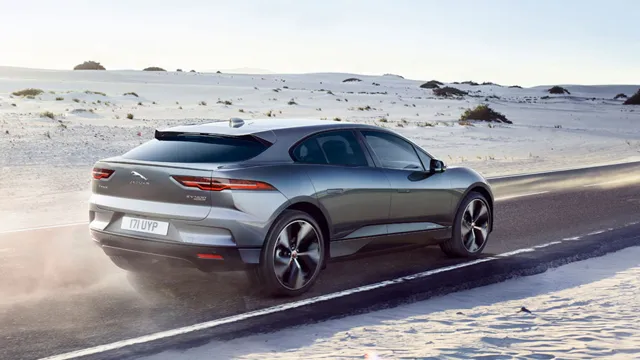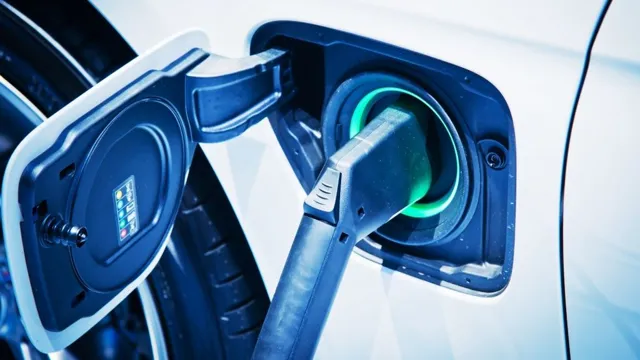Charging Towards a Sustainable Future: The Compelling Evidence that Electric Cars Can Save the Planet
Electric cars have become increasingly popular in recent years, and for good reason. Not only do they offer a stylish and futuristic driving experience, but they are also a powerful tool in the fight to save the planet. The environmental impact of gasoline-powered cars cannot be understated, and electric cars offer a clean and sustainable alternative that is becoming more accessible every day.
But what exactly is it about electric cars that make them so planet-friendly? Let’s take a closer look.
Reduced carbon emissions
There is more evidence mounting to suggest that electric cars really can help save the planet. Perhaps the most compelling is their ability to reduce carbon emissions. Traditional gasoline-powered vehicles produce harmful gases that contribute significantly to climate change.
Electric cars, however, run on electricity, so they produce little to no emissions. A recent study found that switching from a gasoline-powered car to an electric one could reduce carbon emissions by as much as 50%. Imagine what this could do for the planet if more people made the switch! Of course, it’s not just about the environmental benefits.
Driving an electric car can save you money on fuel costs, reduce your dependence on foreign oil, and even improve your driving experience. So, if you’re ready to make a real difference and embrace a more sustainable lifestyle, consider switching to an electric car. You might just be surprised at how easy and rewarding it can be.
Comparing EVs to gas cars
Reduced carbon emissions One of the biggest benefits of electric vehicles (EVs) is their reduced carbon emissions when compared to gas-powered cars. Since EVs run on electricity, they do not produce any direct emissions. On the other hand, traditional gas engines emit harmful gases into the atmosphere like carbon dioxide, nitrogen oxide, and sulfur dioxide.
These gases contribute to the greenhouse effect and air pollution, which are major concerns for environmentalists. EVs, however, emit such low levels of greenhouse gases that they are much eco-friendlier than gas vehicles. Electric vehicles are also much more energy-efficient than traditional gas cars, which means that they require less energy to travel the same distance.
This reduced energy consumption contributes to the decrease in greenhouse gas emissions, which is good for the planet. By switching to electric cars, we can play a vital role in reducing our carbon footprint and combating climate change.

Stats from leading agencies
Reduced carbon emissions are a hot topic in the current world scenario. With the increasing concern about climate change, leading agencies are taking action to minimize carbon emissions. According to the Environmental Protection Agency, carbon dioxide emissions from fossil fuels decreased by 10% in 2020 compared to the previous year.
This reduction can be attributed to the decrease in industrial activity and transportation due to the pandemic. Similarly, the Intergovernmental Panel on Climate Change reported that carbon dioxide emissions should decline by at least 45% by 2030 to limit global warming to 5°C above pre-industrial levels.
However, the reduction in carbon emissions is not consistent across all industries and regions. Several initiatives are being taken by various agencies and governments worldwide to reduce Carbon emissions as much as possible to avoid the adverse effects of climate change in the future.
Less greenhouse gases
It’s becoming clearer each day that electric cars are the way forward in the fight against climate change. Studies continue to show that electric cars emit significantly less greenhouse gases than traditional gasoline-powered vehicles, making them a vital part of reducing emissions and tackling the global problem of air pollution. With more and more consumers becoming environmentally conscious, the demand for electric cars is on the rise.
In addition to reducing harmful emissions, electric cars also offer a range of other benefits such as lower fuel costs, lower maintenance costs, and a smoother, quieter ride. So, if you want to save money and help save the planet, it’s time to consider making the switch to an electric vehicle. Together we can make a difference and create a more sustainable future for everyone.
EVs vs traditional cars’ emissions
When it comes to emissions, electric vehicles (EVs) have a clear advantage over traditional cars. EVs emit significantly less greenhouse gases than their gasoline-powered counterparts. This is because EVs don’t rely on fossil fuels to operate, which are responsible for a large portion of the world’s emissions.
Instead, they rely on electricity that can be generated from a variety of sources, including renewable energy such as solar and wind power. It’s worth noting that while EVs still produce emissions indirectly, such as during the manufacturing of batteries and electricity generation, they still emit far less than traditional cars. This means that every time you choose an electric vehicle over a traditional one, you’re making a positive impact on the environment by reducing your carbon footprint.
Electricity generation’s impact
Electricity generation has a significant impact on our environment, and one of the most positive effects is the reduction of greenhouse gas emissions. Fossil fuels, such as coal and natural gas, have been the primary sources of electricity generation for many years, but they release harmful carbon dioxide and other greenhouse gases into the atmosphere when burned. The move towards renewable energy sources, such as wind, solar, hydroelectric, and geothermal power, can greatly reduce the amount of greenhouse gases released into the atmosphere.
With renewable technologies increasing in efficiency and becoming more cost-effective, their adoption in the energy mix will continue to grow, leading to a cleaner and healthier planet for future generations. By reducing our reliance on fossil fuels, we can make a significant difference in curbing climate change and protecting our planet’s natural resources.
Future projections
Future projections for reducing greenhouse gases are looking more promising than ever. With the world becoming more environmentally conscious, there is an increasing focus on reducing emissions from all sectors. Governments are implementing policies to encourage the use of renewable energy sources, promote the adoption of electric vehicles, and reduce the amount of waste sent to landfills.
In addition, many industries are making significant investments in sustainable practices, such as reducing energy use in manufacturing processes. Overall, the future looks bright for reducing greenhouse gases and slowing the pace of global warming. By taking proactive measures today, we can ensure a healthier tomorrow for our planet and future generations.
Energy efficiency
Electric cars are becoming increasingly popular, and for good reason. Not only do they offer a more sustainable and eco-friendly mode of transportation, but recent studies have shown that electric cars can also save the planet. One major way they achieve this is through improved energy efficiency.
Gasoline-powered vehicles are notoriously inefficient, with an estimated 80% of the fuel consumed going to waste in the form of heat. In contrast, electric cars are able to convert up to 60% of the energy stored in their batteries into forward motion, making them much more energy-efficient. This increased energy efficiency means that electric cars can travel further on a single charge, reducing the amount of energy needed to operate them.
As more and more people switch to electric cars, we can expect to see a significant reduction in both greenhouse gas emissions and air pollution, ultimately helping to address the urgent challenge of climate change. So, if you’re looking for an eco-friendly vehicle that can help save the planet, electric cars are the way to go.
EVs vs gas cars’ efficiency
When it comes to energy efficiency, electric vehicles (EVs) have a clear advantage over gas cars. This is because EVs convert about 60% of the energy stored in their batteries into motion, while gas cars convert only about 20% of the energy stored in gasoline into motion. This means that EVs need less energy to travel the same distance as a gas car.
Additionally, EVs do not emit pollutants into the atmosphere like gas cars do, making them a cleaner and more environmentally friendly option. While some argue that the production of electricity used to power EVs can be environmentally harmful, the trend towards renewable energy sources such as wind and solar power is making electricity production increasingly cleaner. Overall, the greater energy efficiency of EVs makes them a smart choice for those seeking a sustainable and environmentally friendly means of transportation.
Benefits of regenerative braking
Regenerative braking is an efficient system that captures the otherwise wasted energy during braking. This system converts kinetic energy into electrical energy, which is used to power the vehicle’s electrical systems or stored in a battery for later use. The benefits of regenerative braking are numerous, and one of the significant advantages is energy efficiency.
By using the captured energy from braking, the system reduces the energy needed from the engine and, in turn, reduces fuel consumption and emissions. This translates to significant savings in cost, as energy is used more efficiently and reduces the amount of fuel used per trip. Additionally, the system helps extend the lifespan of braking components since it reduces the amount of wear and tear on the brake pads and rotors.
Overall, regenerative braking is a smart way to increase energy efficiency, reduce fuel consumption, and save money while also helping to reduce harmful emissions.
Growing renewable energy sources
In recent years, there has been increasing evidence that electric cars can play a significant role in reducing the world’s carbon footprint and mitigating climate change. The shift towards renewable energy sources such as wind and solar power have helped to make electric cars even more eco-friendly. While there is still much work to be done, this progress is encouraging – with more emphasis being placed on the development of electric vehicle infrastructure, the potential for even greater carbon savings is becoming increasingly feasible.
The fact that electric cars can be powered by renewable energy sources means that they are significantly less polluting than traditional gasoline-powered vehicles – a fact that has not gone unnoticed by the public. With more and more people looking for ways to reduce their environmental impact, electric cars are becoming an increasingly popular choice. Ultimately, if we can continue to increase the use of renewable energy sources, we could see a significant reduction in our carbon footprint – allowing us to take a significant step towards saving the planet.
Conclusion
With every passing year, the evidence continues to mount in favor of electric cars as the key to saving our planet. Not only do they produce significantly lower emissions than their conventional counterparts, but technological advancements constantly push the boundaries of what we thought possible for electric vehicles. From increased battery range to faster charging times, the future of electric cars looks brighter than ever before.
So, if you want to do your part in protecting the environment and pushing the boundaries of innovation, it’s time to ditch the gas guzzler and go electric. Your planet (and wallet) will thank you.”
FAQs
How do electric cars save the planet?
Electric cars save the planet by emitting fewer greenhouse gases than gasoline-powered cars, reducing air pollution and mitigating climate change.
Are electric cars really better for the environment?
Yes, electric cars are better for the environment because they emit fewer pollutants and greenhouse gases, reducing the carbon footprint and air pollution.
Can electric cars reduce our dependence on fossil fuels?
Yes, electric cars can reduce our dependence on fossil fuels because they can be powered by renewable energy sources like solar or wind power, reducing our reliance on non-renewable energy sources.
How much money can you save by driving an electric car?
Owners of electric cars can save money on fuel and maintenance costs because electric cars have a lower cost of ownership and require less maintenance than traditional gasoline-powered cars. Additionally, tax incentives and rebates may be available for owners of electric vehicles.







